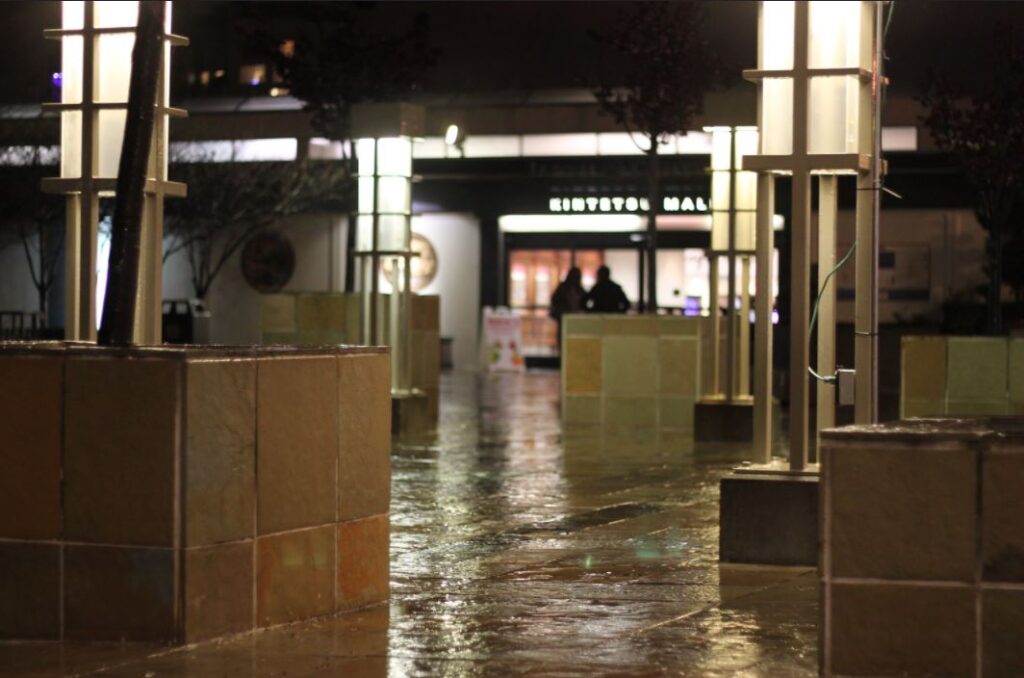Japan Center Mall ; Photo by Dan Ryan via Flickr Creative Commons
Several San Francisco Japantown businesses are in dire need of help to avoid being evicted for inability to pay rent, Rafu Shimpo reports. Merchants in Japan Center, the indoor mall built in the 1960s adjacent to the iconic Peace Pagoda, are among some of the most worried over their businesses’ longevity.
The SF Chronicle reports that Governor Gavin Newsom signed an executive order on September 23rd in an attempt to aid California’s small businesses. The executive order gives local governments authority to “continue banning commercial evictions of tenants affected by the coronavirus pandemic until the end of March 2021.”
According to KQED, “Mayor London Breed has now extended the [commercial eviction moratorium] until November 30, 2020.” This follows an updated report of the original moratorium which was set to expire at the end of September. The 60-day extension allows many of these businesses to breathe a temporary sigh of relief, as rent payments are deferred once again. But the severe decline in business due to COVID-19 have increasingly forced business owners to scale back operation hours and employment.
Rafu reports that Supervisor Dean Preston of District 5 (including Chinatown) and Supervisor Aaron Peskin of District 3 (including Japantown) are “calling for longer-term relief [allowing] small businesses until December 31, 2021 to make good on back rent. [This would allow landlords] — themselves hampered by mortgage and other loan repayments — to avail themselves of hardship protections.”
LATEST STORIES
Meanwhile, due to communication breakdowns with one of the two Japan Center landlords — Kinokuniya Bookstores — business owners are still unable to contact them. According to an opinion piece in The San Francisco Examiner, “Kinokuniya Bookstores of America has refused to respond to any of its tenants’ attempts to negotiate rent.” Rafu notes that day-to-day management of all Kinokuniya Bookstore properties was taken over by Davis Property Management in 2018. In addition to the San Francisco location, “Kinokuniya USA has bookstores in San Jose, Los Angeles, Santa Monica, Torrance”, and at least 9 other U.S. cities.
The San Francisco Examiner says, “Restaurants and other retail businesses throughout [San Francisco] are clamoring for additional monetary relief while some property owners remain unrelenting in their ongoing demands for full rent. Fears abound that as soon as protections expire, dozens of businesses, some that have operated for decades, will receive immediate eviction notices. The cost of inaction will no doubt be severe. Small merchants are the bedrock of our city’s neighborhood characters. We cannot let them be stamped out of existence for playing by the rules in a global pandemic.”
Even the mega-popular attraction Pika Pika which opened in the Kinokuniya building in 2006, offering purikura — Japanese photo booths — is not immune to eviction worries. Owner Ryan Kimura has responded to the frustrations he and fellow Japantown merchants face by spearheading a Change.org petition. Titled, Keep Our Small Businesses Alive in San Francisco!, Kimura seeks two conditions: “(1) Do not allow landlords to charge late charges or default interest on rent not paid during the moratorium” and “(2) Give tenants at least one year after the emergency order is lifted to repay any rent deferred.” So far, more than 1,300 signatures have been collected.

According to owner Etsuyoshi Shimada of Neat Asian Things, which sells Japanese furnishings and goods, there’s been a 70% reduction of customers to his store since the pandemic began. He told KTVU, “I’m so stressed, so stressed out every day. I worry about my future.”
Similarly, owners Anne and Richard Matsuno of Kissako Tea in the Kinokuniya building told The Examiner, “The community has been very supportive of our business… We’ve just been doing the best we can to support each other — our fellow tenants and the community — [and] getting the word out that there are people here and that we’re still open.”
Matcha Maiko Cafe, Festa Karaoke Bar, and Sakura Sakura (Japanese clothing, jewelry, and accessories) are among additional Japan Center stores still threatened by potential future evictions.
According to Rafu, Asian Pacific Islander Legal Outreach (APILO) attorney Diane Matsuda is working with Perkins Cole Law Firm to negotiate with the landlords for 40 Japan Center tenants. Matsuda says, “[We] want to do everything we can to assist [these] small businesses. [Some] have been in our community for over 40 years, [providing] goods and services that highlight our culture, traditions and history. If we lose them, 90% of what we call Japantown will be gone and cannot be replaced. The owners have put their heart, soul and life savings to stay alive during the pandemic as they know their stores mean more to them and the community than just a business.”
Matsuda also criticized landlords while praising city leaders: “The non-response from these landlords illustrate that they do not value and appreciate the contributions and 150-plus-year legacy of the Japanese American community in San Francisco,” she tells Rafu. “Luckily we have city leaders who have been very responsive to our urgent request for assistance. It is our hope that we can utilize the extension of the moratorium on commercial tenant evictions to negotiate some type of agreement that will allow our clients to remain and thrive in the community.”
According to Rafu, real estate attorney Allan Low is working pro bono to help small businesses in the city’s Asian cultural districts. He highlights the depth of financial problems COVID-19 is creating on multiple levels: “The fundamental problems are that there is not enough money and the entire real estate ecosystem is screwed up,” he says. “Tenants do not have the revenue to pay the rent, and suffered 75 percent or more in loss of revenues. That is not enough money to continue as a going concern even with slow, partial reopening of malls and businesses.”
Low warns how these problems will continue to snowball: “If tenants cannot pay the rent, landlords will struggle paying mortgages, taxes, insurance, and operating costs. And if that occurs, the banks, financial institutions, and cities will suffer. But, the entire expense should not fall on tenants, and a heartless approach to allow tenants to fail is extremely short-sighted and a stupid economic strategy. [It] will only result in retail store vacancies and city blight. Landlords, tenants, banks, and governments need to work with each other and find shared solutions.”
As a closing thought, Low echoes Matsuda on the historic, present, and future importance of San Francisco’s neighborhoods and communities: “Japantown, Chinatown, communities of color, and small business commercial corridors are sacred places,” he tells Rafu. “These are the neighborhoods where new arrivals and many of our families started. [This is] where the true startups begin. It is also the cultural bond that keeps cities and regions together, and frankly keeps cities interesting and worthy to fight for preservation.”
For the near future, APILO hopes to establish a fundraising page for these businesses on its website. Updates can be found at: www.apilo.org.
AsAmNews has Asian America in its heart. We’re an all-volunteer effort of dedicated staff and interns. Check out our new Instagram account. Go to our Twitter feed and Facebook page for more content. Please consider interning, joining our staff, or submitting a story.










